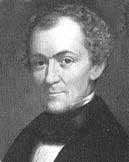Biographies
 Nicholas Trist
Nicholas Trist Nicholas Trist
Nicolas Trist, born into an aristocratic Virginia family in 1800, grew up in Louisiana, but returned to Virginia as an adult to practice law. Married to Thomas Jeffersonís granddaughter, Trist earned a reputation as an erudite man of principle. He entered government service in 1828 as a clerk in the State Department before becoming President Andrew Jacksonís private secretary. He went to Cuba as U.S. Consul in 1833, holding that post for the next eight years. President James J. Polk advanced Tristís government career by appointing him chief clerk of the State Department in 1845.
Secretary of State James Buchanan convinced Polk to send Trist as his executive agent to negotiate an end to the U.S.-Mexican War. In April 1847, Trist plunged into the new role with passion. Despite a rocky start, he and General Winfield Scott soon became close friends. Polk, an open critic of Scott, became convinced that this relationship would undermine his aggressive diplomatic agenda and recalled Trist that October. The Virginian brooded over the news, then boldly refused to leave Mexico and continued negotiations to end the war. On February 2, 1848, Trist completed the Treaty of Guadalupe Hidalgo, an outline for the cessation of hostilities. Polk, furious over Tristís insubordination, accepted the document based on its merits, but fired Trist anyway, and refused to pay him wages beyond October 1847.
The career civil servant returned home, financially strapped and embarrassed over the role he had played in the war. Trist served in mundane office jobs for the Philadelphia, Wilmington, and Baltimore Railroad for the next twenty-two years, before receiving the position of Postmaster of Alexandria Virginia in 1870 - and back wages denied him by Polk. He died at his post in 1874, a dimly remembered character of the nationís first major foreign adventure.










